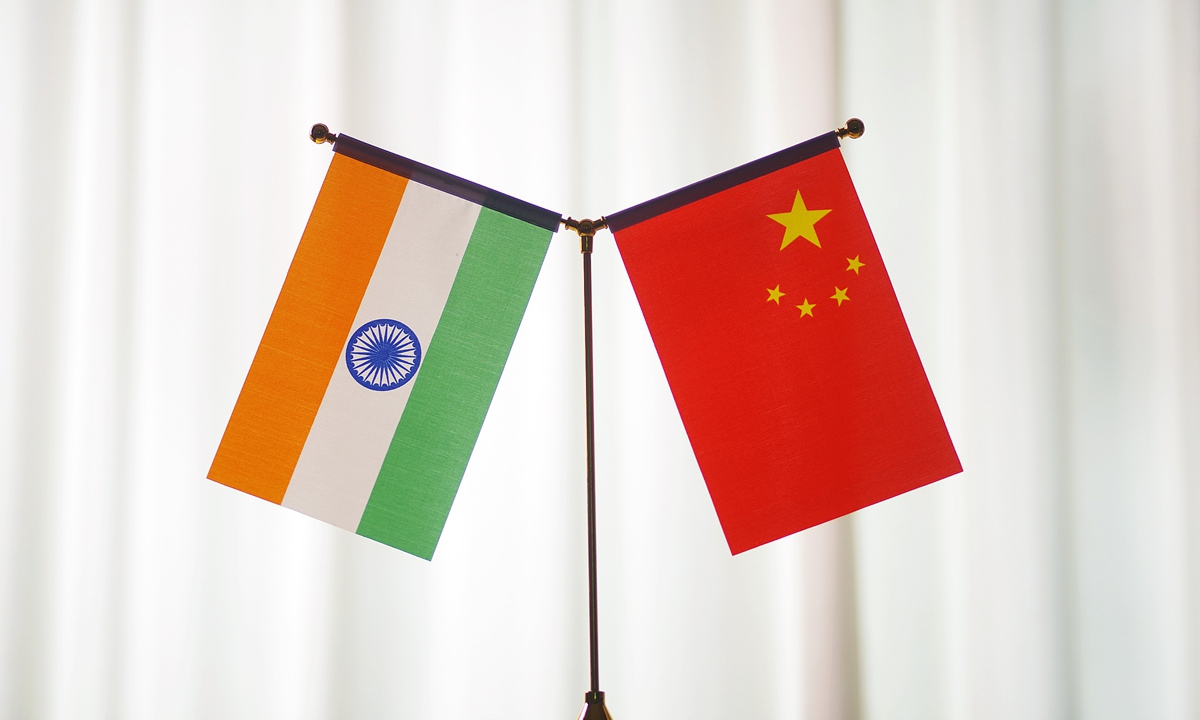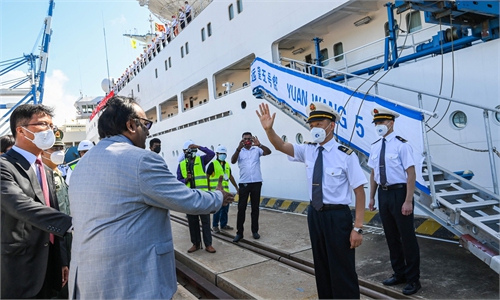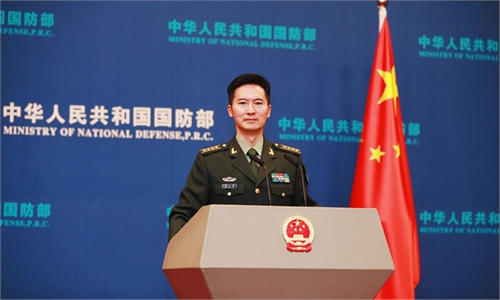Indian mission to Sri Lanka's referral to Taiwan question reveals some politicians' speculative illusion: analysts
China will not compromise on other issues while dealing with Taiwan Straits tensions

China India Photo:CFP
It is wrong and a speculative illusion for a group of politicians in India to think that it can benefit from interfering in the Taiwan question or push China to make compromises on border issues while China is dealing with the tense situation in the Taiwan Straits, Chinese analysts warned Monday, after a tweet by the High Commission of India in Sri Lanka was interpreted by Indian media as a change from the Indian government's previous views over China's military drills in response to the US House Speaker Nancy Pelosi's visit to the island of Taiwan.
In response to what it called "queries concerning Chinese Ambassador Qi Zhenhong's article that drew a 'connection between militarization of the Taiwan Straits and the visit by China's Yuan Wang 5 ship to Hambantota'," the High Commission of India in Sri Lanka on Saturday posted a series of tweets criticizing the Chinese ambassador's referral to "aggression" faced by Sri Lanka from its "northern neighbor" as a "violation of basic diplomatic etiquette" and this "may be a personal trait or reflecting a larger national attitude."
On August 26, Chinese Ambassador to Sri Lanka Qi Zhenhong published a signed article in the Sri Lankan Guardian saying that it is good to see the Sri Lanka government finally allowing the Chinese scientific research vessel "Yuan Wang 5" to dock at Hambantota Port. When reviewing the history of Sri Lanka, Ambassador Qi noted the country had overcome "aggression from its northern neighbor 17 times, colonization by the West for 450 years, and an anti-terrorism war for nearly three decades."
Despite its denials, India's continuous pressure on the Sri Lankan government over the docking of "Yuan Wang 5" is clear for the world to see, and if India attempts to use this issue to interfere in the Taiwan question, it would damage bilateral relations, said observers.
"People who are familiar with China's diplomatic language understand that the Chinese ambassador did not mention India by name to save its face and to preserve relations between China and India, while the High Commission of India in Sri Lanka's tweets revealed that India is the one that prevented Yuan Wang 5 from docking in Sri Lanka," Qian Feng, director of the research department at the National Strategy Institute at Tsinghua University, told the Global Times.
By mentioning the Taiwan question, some politicians in India want to dock with the US' anti-China strategy in the Asia-Pacific region. Some may also harbor the illusion that while China is busy dealing with threats in the southeast and relations with the US, it may make compromises on negotiations in its border issues, Qian said, noting that India should know that China will not make any compromise on matters related to its sovereignty and core interests.
Earlier this month, Indian External Affairs Ministry spokesperson Arindam Bagchi said the ministry was concerned over the developments of tensions across the Taiwan Straits and called for "the exercise of restraint, avoidance of unilateral actions to change the status quo and de-escalation of tensions" in the region, reported PTI. Reuters reported that when asked about India's position on the one-China principle, Bagchi said "India's relevant policies are well known and consistent."
Qian said that the Indian government's stance on the Taiwan question has not changed, otherwise, it would be on the opposite side of the majority of countries in the world, as more than 170 countries and international organizations as well as many political parties globally have reiterated their support for one-China principle after Pelosi's highly provocative visit to the island of Taiwan.
Some analysts also pointed out that some Indian politicians may take Pelosi's visit as an opportunity to isolate China by hyping the "China threat", especially in South Asia, and to gain extra advantages in its relations with China especially on border issues.
Aside from hyping "security concerns" over China's Yuan Wang 5 visit to Sri Lanka, analysts noted that India is also disturbing China's exchanges with countries in South Asia. For example, before Nepal Foreign Minister Narayan Khadka's visit to China in the middle of August, European Union ambassadors in Kathmandu requested a meeting with the Foreign Minister to express their displeasure. And on August 10, Indian and Western media hyped Bangladesh's finance minister Mustafa Kamal's "warning" about taking more loans through China's Belt and Road Initiative.
India, which has the support of the Europeans, has become active in the Taiwan question, and understands the environment in which it can take advantage of the US' anti-China policy. The morale of the Indians has increased as the interests of Americans, Europeans, and Indians are immediately aligned, Prem Sagar, the president of Kathmandu-based Nepal-China Mutual Co-operation Society, told the Global Times.
India has treated South Asia as its sphere of influence and does not want to see regional countries develop good relations with China. This is why India is hyping China's "debt trap" and "China threat", and it is India that is interfering with these countries' domestic affairs, Long Xingchun, a senior research fellow with the Academy of Regional and Global Governance at the Beijing Foreign Studies University and president of the Chengdu Institute of World Affairs, told the Global Times.



